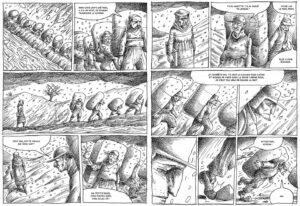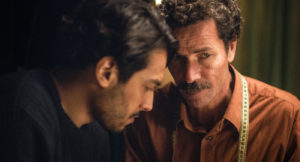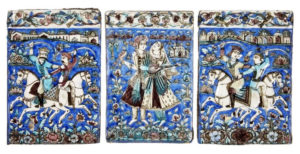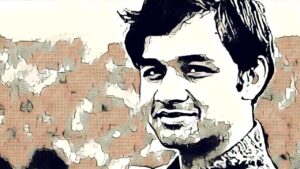In a modern interpretation of Eros and Thanatos, the narrator recounts how thwarted love can lead to unexpected consequences.
Hisham Al-Najjar
Translated from the Arabic by Essam M. Al-Jassim
I knew fate had brought us together the moment I first laid eyes on him.
While I’d always had the feeling something bad would happen between us, I had no idea the course of our lives would take the turn it did.
I’m unsure why, after all these years, I sit here and put pen to paper, especially to write about him. Never did I think I would tell our story. I’ve never had much interest in books, or even newspapers. Although I tend to catch snippets of the news on the television, the process of attempting to convey my thoughts and feelings through the powerful medium of words is completely new to me. The truth is, I’ve never cared much about language: the boring pages, the droning of political analysts, or the dialogues and arguments of talk shows. And the only thing I cared about before meeting Yusuf was my looks.
Now, as I gaze into the mirror and scrutinize my wizened, wrinkled features and winter-white hair, I wish I could rewind time fifty years back; mind you, not to relive my life’s experiences, but rather to live a different life altogether, and to change the person I used to be.
So, why is it that I’m writing about Yusuf?
Well, possibly because he shocked me to my core. He rescued me, pulled me out of my reality, and completely changed the path of my life. He jolted me out of my ego coma and surprised me with the discursive truth of life. He quashed the inner howl of vanity and ambition to which I’d become addicted, breaking my cycle of shallow, reckless, directionless relationships. And maybe it was because he altered my view of people and my lifestyle altogether. He saved me from an enemy I never even knew I had —myself. For those reasons and many more, I am writing about Yusuf today.
Only Yusuf? Who else?
Yes, it was only Yusuf who left an indelible mark on me, and because of this, he will remain in my soul until age fades my memory. Only when my heart stops will my affection for him cease.
Yusuf was exceptionally handsome and the most charming of all the men I’ve ever known. I first met him in the director’s office when he submitted his job application. When his restless eyes caught mine, I thought, This is it! Finally, I have found the one I’m looking for. Exhilaration coursed through my veins, and I had a feeling that everything I’d experienced up until that point had been worth it because all of it had led me to this perfect moment in my life.
None of my other relationships, particularly those with male colleagues, is worth mentioning here. I hardly remember any of my trysts, and that was mainly because they were all the same. I wanted to end each of them before they’d even begun. All attempts at flirtation made by my male friends, coworkers, and department heads had been doomed to fail; but I didn’t mind teasing them by spewing some insincere flattery here and flashing a smile there. I was a gorgeous and classy young lady. Even now, in my seventies, I still am. Everyone wanted a glance from me. However, shortly after we met, Yusuf changed my perception of beauty.
When I asked him his name, he gazed down at his feet and shyly whispered, “Yusuf.”
Next, I asked where he lived.
Fear lacing his voice, he answered, “I live in a dark, frightening neighborhood inhabited by thugs, harassers, and criminals.”
His answer shocked me. I laughed to ease the tension and continued my probing. The more I learned, the more I liked him, and I couldn’t help ending my interrogation with, “In all these years, why haven’t I met you before?”
Oh, God! An entire year passed, during which this emotionally frigid man persistently refrained from giving me anything but straightforward replies. I still remember his curt responses and his askance gaze whenever he looked at me. He treated me like just another one of his male colleagues! I recall wondering how a man like him could reject a beautiful woman like the one before him. What kind of power did he possess to be capable of avoiding being drawn to me?
I nearly fell to insanity as I gradually lost my pride in the face of this creature’s resilience. I would have preferred to die than to accept he would never succumb to my charms.
“Who do you think you are?” I eventually asked him.
He looked at me with frozen eyes and a cold, bloodless face. After a moment, a tense, haunted expression appeared. His eyes grew enlarged, and then welled with tears. He promptly rose and ran from the office.
I saw him a short while later as he was leaving the building. I moved to the window overlooking the main street, my eyes following his path as he ran between moving cars as though someone were chasing him.
My pride overpowered me.
At the time, I didn’t consider trying to uncover the mysterious man’s secret. I didn’t bother to look for what he might be hiding. On that day, all I wanted was to defeat him, to break him, and reclaim my dignity. I exploited my feminine wiles among my colleagues; took advantage of my overwhelming effect on the company’s director, the janitor, the courier, and even the office boy who made us coffee and tea. And then I turned all that power against Yusuf.
After that, Yusuf endured two days of harsh sarcasm, hurtful comments, and challenging, humiliating assignments. Then he disappeared, as if he’d never entered our office doors at all.
Conflicted, I waited for him to reappear, my feelings wavering between my yearning for love, my craving for instant gratification, and my desire for vengeance.
He didn’t return. Days felt like years. He occupied my every thought, and I no longer had passion for anything else. My appetite for mundane, worldly events crumbled.
I found his phone number and address in his employee file. Even though I watched his flat for days, my efforts to reach him proved fruitless—no one ever came home. Eventually, I mustered all my courage and poise and knocked on his neighbor’s door.
“He died two days ago.” The man spat the words in my face. Shock turned my entire body cold.
“How?” I asked, stunned.
He told me that Yusuf had not only been his dear neighbor but also his best friend. Then he shared Yusuf’s story from beginning to end.
Yusuf had come to the city fleeing his brothers, who had tried to kill him following a dispute over a piece of land his mother had bequeathed to him before she died. Yusuf’s wife and son had both died during childbirth.
The neighbor told me about the new position Yusuf obtained at the company and the consequent suffering he’d faced there. He bitterly described Yusuf’s plans to act on his feelings toward his pretty female colleague. My heart plummeted when he told me of Yusuf’s intention to propose to the beautiful lady once his sorrows faded. He was waiting until the pain of losing his wife and son had abated.
Years later, I couldn’t hide my discomfort and shame when my eldest son asked me, “Why do you always start your reading of the Qur’an with Surat Yusuf when you finish performing the Tahajjud nightly prayer? Why do you silently cry every time you repeat Allah’s words from that holy chapter, ‘Kill Yusuf’?”
How could I admit to him that I was praying for Yusuf’s death so I would be forgiven for all the ways I wronged him?













































I was extremely touched by this heart-wrenching, sad, and distressing story.
A great read.
thank you
I felt each heartbreaking pain and wished I could make things better.
It was a worthwhile read.